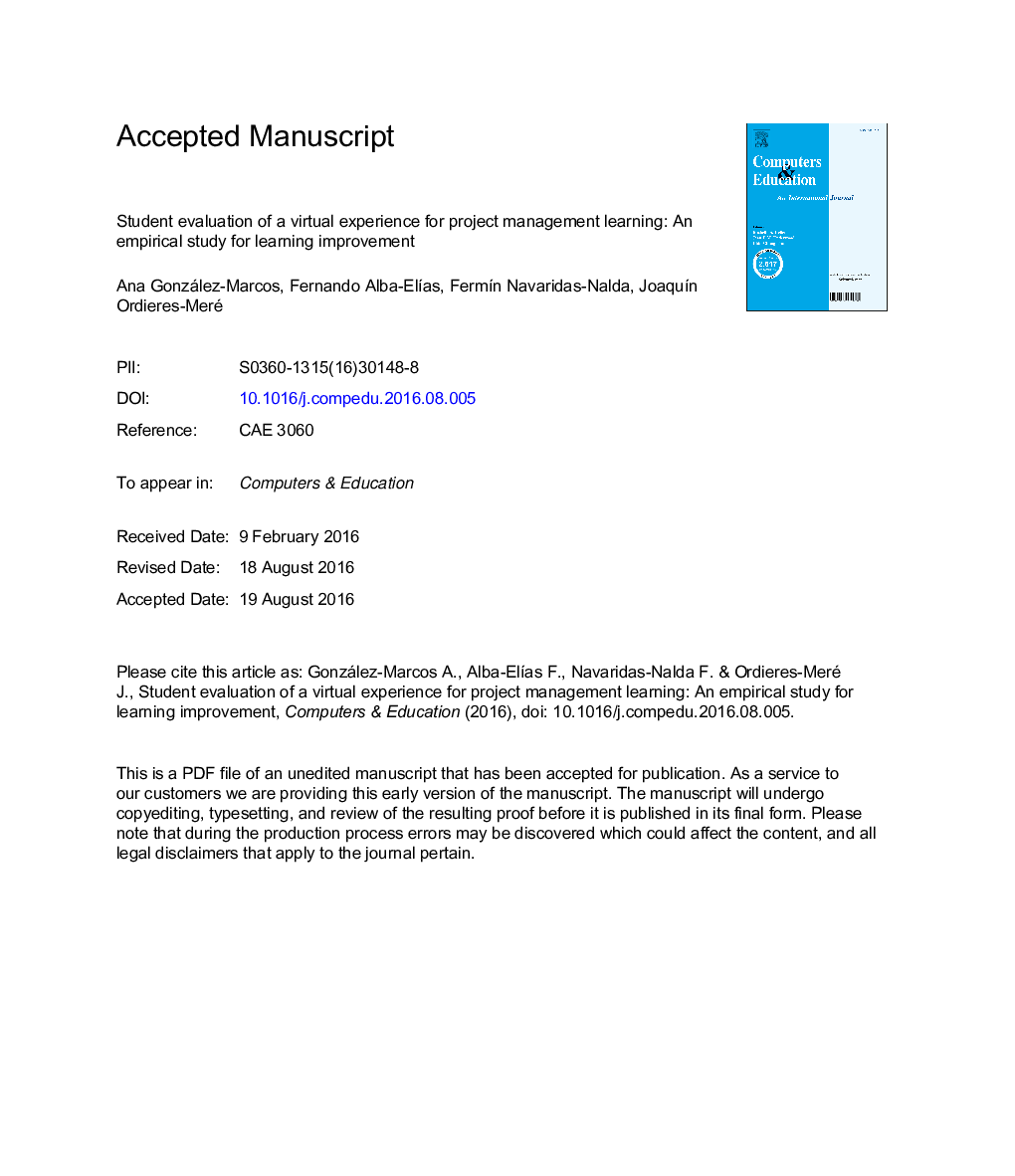| کد مقاله | کد نشریه | سال انتشار | مقاله انگلیسی | نسخه تمام متن |
|---|---|---|---|---|
| 6834840 | 618157 | 2016 | 34 صفحه PDF | دانلود رایگان |
عنوان انگلیسی مقاله ISI
Student evaluation of a virtual experience for project management learning: An empirical study for learning improvement
ترجمه فارسی عنوان
ارزیابی دانشجویان از تجربه مجازی برای یادگیری مدیریت پروژه: یک مطالعه تجربی برای بهبود یادگیری
دانلود مقاله + سفارش ترجمه
دانلود مقاله ISI انگلیسی
رایگان برای ایرانیان
کلمات کلیدی
مدیریت پروژه، یادگیری موقعیت رضایت دانشجو، عملکرد دانشجویی، گروه های مجازی،
ترجمه چکیده
آموزش مدیریت پروژه به طور سنتی بر اساس پارادایم توصیفی طراحی شده است. با این حال، باید تعریف دوباره برای تعامل با دانش آموزان در تفکر بالاتر و تسهیل یادگیری موثر داشته باشد. این مطالعه رویکرد دانشجویی محور را پیشنهاد می کند که با تئوری یادگیری مکان در تیم های مجازی سازگار است و تاثیر آن بر رضایت دانشجویان و نتایج یادگیری را بررسی می کند. با استفاده از یک طرح نیمه تجربی، 122 دانشجوی کارشناسی و کارشناسی ارشد در دوره های مدیریت پروژه در دو دانشگاه در مناطق جداگانه ثبت نام کردند. آنها به صورت تصادفی به دو گروه تقسیم شدند که یک گروه آزمایشی بودند که در آن دانش آموزان از رویکرد دانشجویی محور و گروه کنترل استفاده کردند که در آن دانش آموزان یک دوره آموزشی سنتی تر را دنبال کردند. تجزیه و تحلیل داده ها با استفاده از روش پیشنهادی، سطح بالایی از رضایت و عملکرد را نشان داد. این نتایج نشان می دهد که روش ارائه شده، که بر مبنای یادگیری مبتنی بر پروژه در یک زمینه معتبر ارائه شده است که فرصتی برای دانش آموزان برای تجربه کار تیمی مجازی فراهم می آورد، از روش های آموزش سنتی موثرتر بود. علاوه بر این، بین رضایت دانشجویان و نمرات نهایی آنها رابطه مثبت و معنی داری وجود دارد. در این زمینه، جنبه های مرتبط تر برای بهبود عملکرد تحصیلی دانش آموزان (1) انتظارات مثبت از پیشرفت حرفه ای آینده، (2) اهداف واضح آموزشی که به طور مداوم با محتوای درس ارتباط دارند، (3) احساسات مثبت ناشی از معلمان پشتیبانی در حل شک و تردید و (4) خودآزمایی آکادمیک. یافته های این مطالعه نشان می دهد که حالت های انگیزشی و عاطفی بر دانش آموزان در آموزش عالی تأثیر می گذارند. این سازگار با نظریه های یادگیری فعلی است.
موضوعات مرتبط
علوم انسانی و اجتماعی
علوم اجتماعی
آموزش
چکیده انگلیسی
Project management education was designed traditionally according to an expository paradigm. However, it needs to be redefined to engage students in higher order thinking and to facilitate effective learning. This study proposes a student-centered approach that is aligned with situated learning theory in virtual teams and explores its impact on student satisfaction and learning outcomes. Using a quasi-experimental design, 122 undergraduate and master's degree students enrolled in project management courses at two universities in separate locations. They were separated randomly into two groups, an experimental group in which students used the proposed student-centered approach and a control group in which students followed a more traditional course design. Data analysis indicated a higher level of satisfaction and performance with the proposed methodology. These results suggest that the presented methodology, which was based on project-based learning in an authentic context that offers opportunities for students to experience virtual teamwork, was more effective than traditional teaching approaches. Furthermore, there were some positive and significant correlations between students' satisfaction and their final marks. In this matter, the most relevant aspects to facilitate students' academic performance were (1) positive expectations of future professional development, (2) clear learning objectives that consistently relate to the content of the course, (3) positive feelings induced by teachers' support in resolving doubts, and (4) academic self-perception. The findings of this study suggest that motivational and affective states influence student learning in higher education. This is consistent with current learning theories.
ناشر
Database: Elsevier - ScienceDirect (ساینس دایرکت)
Journal: Computers & Education - Volume 102, November 2016, Pages 172-187
Journal: Computers & Education - Volume 102, November 2016, Pages 172-187
نویسندگان
Ana González-Marcos, Fernando Alba-ElÃas, FermÃn Navaridas-Nalda, JoaquÃn Ordieres-Meré,
